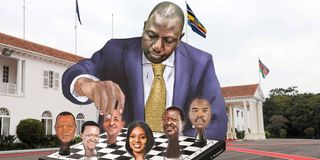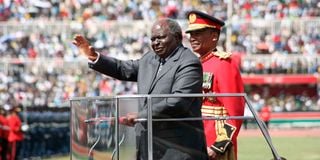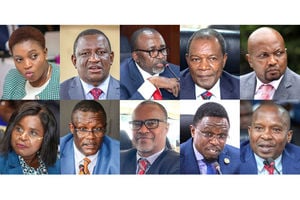
President William Ruto is facing a dilemma over the performance of his Cabinet Secretaries.
President William Ruto is facing a dilemma over the performance of his Cabinet Secretaries: Should he shuffle the team, force their resignation, suspend them, sack them or simply ignore the noise? Or, should impeachment by Parliament act as the pressure valve?
At least six Cabinet Secretaries are facing challenges in their ministries that have a direct impact on the lives of ordinary Kenyans, especially the ‘hustlers’.
With less than two years in power, President Ruto has a tough balancing act to do in regard to CSs who are either underperforming or facing graft allegations.
Thursday’s move by MPs to impeach Agriculture CS Mithika Linturi and a poll which indicated that most of his CSs are dismally performing, delivered a twin dilemma to President Ruto on how to deal with the bad apples in his Cabinet.
Data released by Tifa last week ranked Interior CS Kithure Kindiki as the best performing minister with an overall score of 68 per cent, a mean grade of B. The second highest rank is tied between Prime Cabinet Secretary Musalia Mudavadi and Youth and Sports Cabinet Secretary Ababu Namwamba, who both scored 59 per cent translating to a mean grade of C+.
ICT CS Eliud Owalo scored a C of 51 per cent while Defence CS Aden Duale had a C of 50 per cent. Education CS Ezekiel Machogu and his Public Service counterpart Moses Kuria scored a mean grade of C-. Mr Machogu got 48 per cent of the points with Kuria scoring 45 per cent. Transport CS Kipchumba Murkomen had 41 per cent (D+) with his Lands counterpart Alice Wahome getting 40 per cent (D+).

President William Ruto, Deputy President Rigathi Gachagua and cabinet secretaries after a Cabinet meeting at State House, Nairobi.
It was a bad week for Linturi, who was also ranked as the worst performing CS with an overall rating of 25 per cent.
In August last year, during the signing of performance contracts by CSs and PSs, at State House, President Ruto said some of the CSs and PSs are clueless about what is happening in their respective departments and ministries.
“I call many PSs and ask them what is going on here and they have no clue and this is your department that is the job that you have; you are not a messenger, you are not a security person, you are not a photographer, you are not a watchman,” he said.
Rarieda MP Otiende Amollo says this is a good reason reason for the President to make changes and bring in new people.
“The President himself had told us that some of his CSs and PSs are not aware of what is going on in their ministries, so why is he still keeping them?” Dr Amollo said. Analysts say this is the best time to sack some of the underperforming CSs and also those implicated in allegations of corruption.
They point out President Ruto should sack Linturi — even if he gets off the hook by MPs — to send a strong message. “If the President loves Mr Linturi, this is the best time to sack him.
Because, if the select committee finds him guilty, he will not be eligible for any other job such as an ambassadorial role as he will have to be vetted by the same House that impeached him,” says Javas Bigambo, a political analyst.
Mr Bigambo says President Ruto’s dilemma is compounded by the fact that some of the affected CSs stood with him during his tumultuous time as the Deputy President.
“Some of these CSs were a major plank to his success but the problem is, if he continues with them with the allegations of corruption and incompetence hanging around them, then it will mutate into impunity as some of them will feel untouchable,” says Mr Bigambo.
He notes that the continual stay of some CSs hampers the implementation of the government agenda and overly embarrasses the President and the government at large.
Nominated MP John Mbadi says it is now clear that many CSs are weak. “Only two per cent of the Cabinet is competent. CSs in some sensitive ministries are just incompetent and should have not even have made it to the Cabinet,” says Mr Mbadi.

National Assembly Public Accounts chairperson John Mbadi during the session at Parliament buildings on August 24, 2023.
He says the President should take advantage of the public discontent and sack incompetent CSs. “He should not worry about politics, he owes service delivery to Kenyans,” he offers.
Marakwet West MP Timothy Toroitich says there’s an overall feeling that the Cabinet is weak and the President is actually working alone.
“The impeachment vote on Linturi was a vote to the President to tell him that someone is actually sabotaging him despite working hard,” he states.
The dilemma facing President Ruto is, however, not isolated as previous office holders also had to grapple with cases of corruption and misappropriation of billions of taxpayers in their ministries but had their own unique way of easing public pressure.
In 2015, President Uhuru Kenyatta caved under pressure and suspended six CSs when his administration was facing increased cases of corruption and misappropriation of billions of shillings especially in the executive.
The axe fell on Charity Ngilu (Lands and Settlement), Michael Kamau (Transport) Felix Koskei (Agriculture), Kazungu Kambi (Labour) and Davis Chirchir of Energy.

Retired President Uhuru Kenyatta during an interview with the ‘Nation’ on May 26, 2020.
The list also included principal secretaries and other senior government officials in an announcement made during the State of the Nation address to the two Houses of Parliament. The opportunity to drop some Cabinet Secretaries came at the start of his second term.
Kibaki's stand
Although President Kibaki was slow in cracking the whip on his errant ministers, he did not spare political allies like Kiraitu Murungi and David Mwiraria who he forced to “step aside” over controversies surrounding their ministries.
One of his most bold moves was in 2005, when he sacked his entire Cabinet after suffering a defeat in a referendum on a new constitution. President Kibaki could not withstand his own Cabinet ministers campaigning against the constitution.
Among those that were sacked were Raila Odinga, who was serving as the Minister for Roads, but successfully led the campaigns against the Bomas Constitution.
“I have sacked all ministers and assistant ministers with immediate effect. I will announce a new government before the end of two weeks,” President Kibaki said, adding that the move would help him have a cohesive Cabinet.
In 2009, when the Grand Coalition government was facing a lot of squabbling within, President Kibaki, while on a tour in Kisii, warned that disgruntled ministers would be sacked.
“Kama hajui njia ya kutoka tuta watoa. (If they don’t know the way out, we will get them out),” President Kibaki warned.

Former President Mwai Kibaki and Chief of General Staff Jeremiah Kianga during the 48th Madaraka Day.
During the Grand Coalition Government, President Kibaki was facing a dilemma in disciplining errant CSs as the accord called for consultation between the President and Prime Minister Raila Odinga.
One memorable power struggle played out when Mr Odinga ‘suspended’ then Education Minister Sam Ongeri and Agriculture’s William Ruto, a move that was rescinded by President Kibaki.
Former Roads Minister Franklin Bett, who was State House Comptroller during the tenure of President Daniel arap Moi, told The Weekly Review that the President would do an assessment on what the problem was whenever faced with complaints about a minister.
“President Moi would assess whether the problem was the docket given or the individual. If the problem was the docket, the person would be moved to another ministry but if the problem was the person, he would be dismissed. He had no qualms about that,” Mr Bett said.
Mr Bett, an old hand in the corridors of power quipped that President Moi’s philosophy was ‘shoot and investigate baadaye (later)’ when public pressure was overwhelming.
“He would throw out a fellow and investigate later. This was meant to deflate political pressure,” notes Mr Bett, adding that President Moi remained a good listener and weighed the pros and cons before taking action.
Mr Bett says the usual practice was to replace the ejected individual with somebody from the same region.
“The dilemma facing the President is that this generation wants quick results. During that time, ministers were older and they would be patient with an issue,” he says.
For his 24 years in power, President Moi preferred making changes through the 1pm bulletin on national radio. According to the book 24 years of the Nyayo Era: Moi Cabinets, the ministers were always ready for anything as they were not aware of what could befall them.
“I was not surprised because I was appointed through a radio announcement and I was relieved of my duties through the same,” Mr Darius Mbela said upon his sacking.
President Moi, who had the best intelligence, was aware of everything that his ministers were doing and would gather facts before just striking without any notice against any of his ministers that was going against government positions or plans.










